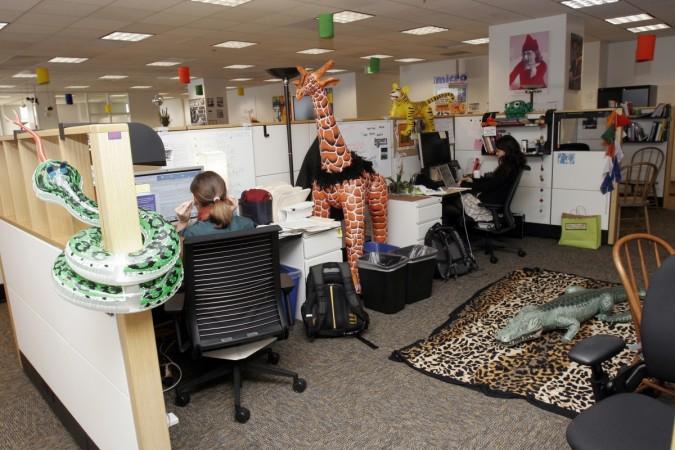
India's growth over the last decade was fuelled by large MNCs in the technology, BFSI, manufacturing and IT/ITeS spaces. However, this new generation has been smitten by the entrepreneurial bug. In the past few years, numerous startups have mushroomed across sectors. The success stories of Flipkart, Snapdeal and Paytm, among others, have inspired more and more people to implement their ideas into successful businesses. The growth of startups has been fuelled by availability of angel and VC funding. However, the funding comes in with various performance milestones and in smaller tranches.
India offers a great opportunity for co-working space operators to profit from rising demand for flexible, innovative and collaborative workspace designs. Colliers estimates that more than 1.2 million sq ft was leased by co-working operators in India in 2016, accounting for 3 percent of overall leasing volumes. Although this represents only a small share of the prevailing total leasing demand, co-working operators are planning to lease 8-9 million sq ft by 2020. Colliers foresees concentration of co-working spaces to intensify further in Bengaluru, Mumbai and Gurugram thanks to the availability of adequate infrastructure and emerging opportunities for startups in these cities.
These new ventures run with basic infrastructure and limited number of employees (3-10) and typically require an Internet connection, meeting rooms, flexibility in terms of timings, good locations so that they can be accessible to clients, limited overheads, and above all, office spaces with limited commitments. Unlike larger companies, these firms cannot afford to make commitments for larger spaces, leases with long tenures and lock-ins with landlords. Neither do they want to invest in furniture fitouts or administration staff.
Flexibility within spaces
The demand for flexible office space with low overheads and minimal commitments led to the inception of co-working spaces. Co-working spaces as a concept has seen tremendous growth and has not only been catering to the prime clientele of startups but also found new demand with professionals such as chartered accountants, consultants and some large organisations that have been using such spaces as incubation centres and satellite offices. Currently, there are about 160 such operators operating over 350 centres across India in various Tier I and Tier II cities. The focus markets for such operators have been Bengaluru, NCR, Mumbai and Hyderabad.
These centres offer immense flexibility and good service to their occupiers. Memberships range from hourly and daily to monthly memberships. Centres are typically located in Grade A buildings in CBD / SBD locations of major cities. Other than the cost benefits and flexibility, these premises also offer a working environment with great networking opportunities with other co-occupiers.
IN DESIGN LINGO
A Cold Shell is basically an empty building consisting of a bare concrete shell with no services connected.
A Warm Shell is still an empty building, but it will be partially fitted out, this means it will most likely be lined with plasterboard walls and ceiling (either grid and tile or plasterboard), carpeted and have basic services connected, e.g. lights, air-conditioning, water.
Large real estate developers see this as an additional opportunity. Developers who were used to leasing large office spaces on long-term bases to corporates are now softening up to the co-working space trend and are increasingly eyeing a share of this pie. These real estate developers are now partnering with established operators of co-working spaces through various models to ensure they become strong players in this space. This also enables developers to build early relationships with tenants who are poised to grow and offer them larger spaces for expansion once the tenant has grown in scale.
Developers are offering their spaces on lease to operators or on a revenue sharing basis. In some cases, the developers are also offering fitouts as part of the package to operators or bring in investors to fund the fitouts and focus on yielding returns on a 'Warm Shell' basis.
Set for a growth leap
The upswing in growth in the co-working space business model with interest from large developers as well as operators has created an investment opportunity for PE/VC investors. The initial moves by developers and operators have established financial credibility for this model. It is established that this segment is here to grow, but for large operators and developers to make the most of this opportunity, large amounts of investment are needed in this business. Hence, this space has attracted PE /VC attention.
This is an opportune time to invest in such a business currently in the growth stages, which offers relatively stable cash flows and is scalable to a large extent. For private equity (PE) or venture capital (VC) investors, the opportunity is multifold: their investments give them access to great financial returns as well as access to larger startup ecosystems, wherein, they can find new and enterprising investment opportunities. Some investors who have actively entered this space include PE firm Sequoia India, which has pumped in Rs 130 crore into co-working space provider Awfis, and Blume ventures which invested approximately Rs 7 crore in Bengaluru based BHIVE.
With the support of a growing ecosystem for startups and demand for flexible office space from small and large corporates as well as investments from institutional investors, real estate developers and operators, this segment of the office space is bound to transform into a large business segment in coming years.
(The author is General Manager, Capital Markets and Investment Services, Colliers International India)

















